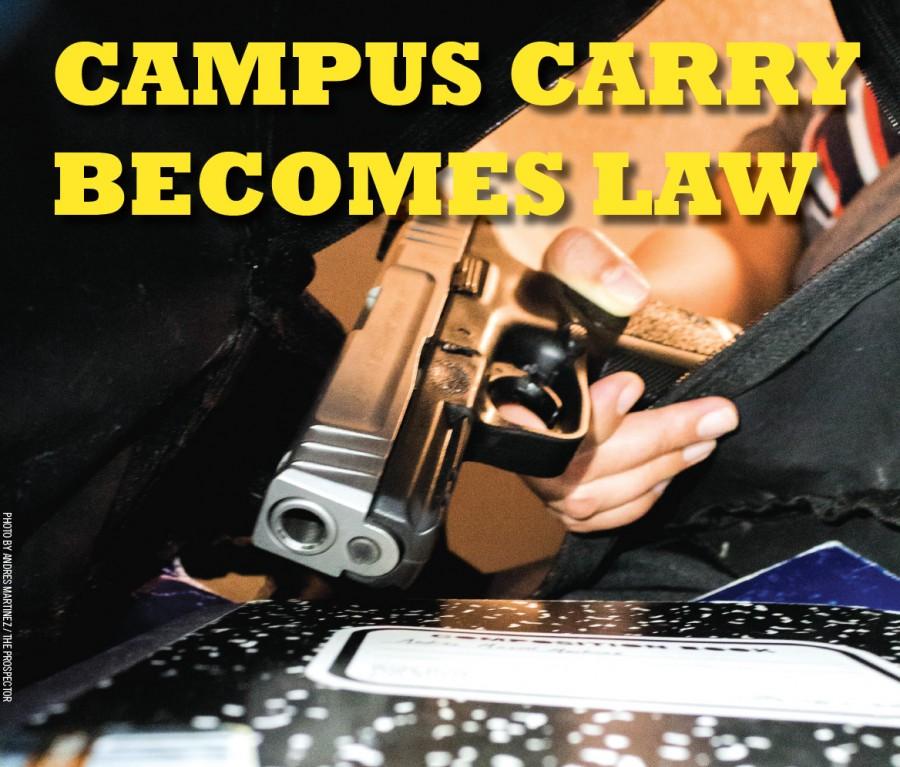After much deliberation surrounding the controversial bill, the Texas Legislature has approved the campus carry bill, which is now on its way to the governor’s desk to be signed into law.
On May 31, Senate Bill 11 was approved by the Texas House in conjunction with the approval of the state Senate the previous day. The Senate approved the bill by votes of 20-11, with all of the chamber’s Democrats opposing it, and the Texas House added its approval with a vote of 98 to 47.
The bill is now on the desk of Gov. Abbott, who has previously expressed that he will sign the bill into law.
“I look forward to seeing the way that legislation works its way through both the Senate and the House, and I will sign whatever legislation reaches my desk that expands Second Amendment rights in Texas,” Abbott said in a press conference at the state Capitol in February.
Although the bill managed to pass, it received significant changes from its original version and will now allow universities to have some control over how to implement the measures.
The final version of the bill will allow universities and colleges to establish their own rules on where handguns are allowed and how to best store them based on public safety concerns. Private universities are able to opt out of the measure altogether.
Only individuals with a concealed handgun license, who must be 21 years old and have gone through the proper state measures to receive said license, would be allowed to carry firearms on campus.
According to information listed by UTEP, in 2007 the average age of undergraduate students was 23, graduate students 32 and doctoral students 35.
Although the passage of the bill is hailed as a victory for gun rights advocates, University of Texas System President William McRaven, an opponent of the bill, expressed some relief about the amendment to the bill in a statement he issued following the bill’s approval.
“It is helpful that the bill was amended to allow our campus presidents to consult with students, faculty and staff to develop rules and regulations that will govern the carrying of concealed handguns on campuses,” he said.
Gary Edens, vice president of student affairs at UTEP, said that the university has been following the legislation process closely and will now begin to discuss the issue.
“We will (discuss policies) now that legislation has been approved,” Edens said. “The nice thing is that it is not going into effect until fall 2016, so we have over a year to talk to students, faculty, staff and the community to see how this affects UTEP.”
A similar view was shared by Ryan C. Holmes, assistant vice president and associate dean of students in the Office of Student Conduct and Conflict Resolution, who said that we have yet to see how this would affect UTEP.
“In the event that we actually were to experience any issue regarding the new legislation, we have to understand that each case is different,” Holmes said.
When asked if guns on campus would change university policies, Holmes said that the same standards would apply to any situation and that decisions would be taken with the proper measures and deliberation.
Campus carry will take effect in August 2016 at universities and August 2017 at community colleges.
Although no decisions have been made yet, Edens said the university will take advantage of the last-minute amendment that would allow universities to carve out gun-free zones.
“We will probably not have guns in our labs, where there might be chemicals or flammable materials, we probably will not have guns in our judicial office, where students are being disciplined,” Edens said. “We haven’t determined where those places are, but that will help.”
Edens also said there would also be fiscal implications for the university as well, as there will have to be retraining of staff and personnel, in addition to the possibility of gun lockers being installed for gun storage, along with other possible costs.
No official timetable was provided as to when an official university response can be expected, but Edens said it will be done once ample analysis and consideration has taken place.
“I don’t think we will have anything soon,” Edens said. “ We will probably spend the fall semester speaking to student government, our law enforcement, our faculty and probably wait for more stuff from the UT System. We will probably not have something until next spring.”
Alonso Moreno may be reached at [email protected].










